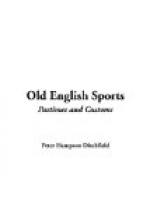When jousts and tournaments were abandoned, tilting on horseback at a ring became a favourite courtly amusement. A ring was suspended on a level with the eye of the rider; and the sport consisted in riding towards the ring, and sending the point of a lance through it, and so bearing it away. Great skill was required to accomplish this surely and gracefully. Ascham, a writer in the sixteenth century, tells us what accomplishments were required from the complete English gentleman of the period. “To ride comely, to run fair at the tilt or ring, to play at all weapons, to shoot fair in bow, or surely in gun; to vault lustily, to run, to leap, to wrestle, to swim, to dance comely, to sing, and play of instruments cunningly; to hawk, to hunt, to play at tennis, and all pastimes generally which be joined to labour, containing either some fit exercises for war, or some pleasant pastime for peace—these be not only comely and decent, but also very necessary for a courtly gentleman to use.” The courtly gentleman must have been very industrious to acquire all these numerous accomplishments!
There was another form of spectacle which gave great pleasure to our ancestors; and often in the market-places of old towns, or in open fields, at the bottom of natural amphitheatres near some of the ancient monasteries, were Scriptural plays performed, which were called Miracles, or Mysteries, because they treated of scenes taken from the Old or New Testament, or from the lives of saints and martyrs. The performances were very simple and often grotesque, but the plays were regarded by the monks, who assisted in these representations, as a means of teaching the people sacred truths. The miracle play of Norman and mediaeval times was a long, disconnected performance, which often lasted many days. In the reign of Henry IV. there was a play which lasted eight days, and, beginning with the creation of the world, contained the greater part of the history of the Old and the New Testament. The words of the play seem to us strange, and sometimes profane; but they were not thought to be so by those who listened to them. The Mystery play only lasted one day, and consisted of one subject, such as The Conversion of St. Paul. Noah and the Flood was a very popular piece. His wife is represented as being much opposed to the perilous voyage in the ark, and abuses Noah very severely for compelling her to go. Sometimes the authors thought it necessary to introduce a comic character to enliven the dullness of the performance. But, in spite of humorous demons, these mysteries ceased to attract, and plays called Moralities were introduced, in which the actors assumed the parts of personified virtues, &c., and you might have heard “Faith” preaching to “Prudence,” or “Death” lecturing “Beauty” and “Pride.” The first miracle play performed in England was that of St. Catherine, which was acted at Dunstable, 1110 A.D.; and another




